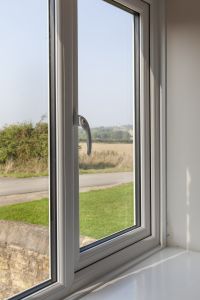Ever wondered why windows mist?
11th October 2016
Ever wondered why windows mist?
Craig Smith, Managing Director Copperfield Windows, explains how condensation occurs on the outside of double and triple-glazed windows in the autumn and spring.
John Keats once wrote ‘a season of mists and mellow fruitfulness’. And this is exactly the reason why your energy efficient windows and the glazed units on doors can become misted on the outside in the early autumn going into winter and again come the spring.
People talk to us about this all the time. People often buy new windows to help them to address problems with internal condensation. In this case energy efficient double and triple-glazed windows help internal condensation as a barrier is placed between warm air inside and the cold outside.
The cause of internal and external condensation is moisture in the air and dew point. This is the point at which moisture and water vapour in the air forms into droplets or ‘dew’ when they touch cold surfaces.
This is the reason why if you have single-glazed windows you will get condensation on colder days. A house is always full of moisture from things like cooking and showering. If it’s cold outside, single-glazed windows will be cold on the inside. The water vapour in warm air is attracted to the colder glass, forming internal condensation.
This issue is minor in double glazed and triple glazed windows because the temperature of the inside pane is warmer in comparison – the cold air outside is blocked by the external pane. But conversely in contributing to a reduction in internal condensation energy efficient double and triple-glazed windows reduce the amount of heat escaping from your home, which means in certain conditions, it’s more likely to form on the outside.
In later summer evenings when it get's cooler, the energy efficiency of thermally efficient double glazed units over single glazed windows, means that there is so little energy and warmth escaping your home, that the temperature of the external pane, falls to a level below that of the air temperature or the dew point.
Naturally, vapour occurs in the air condenses on external glass, which can leave windows misted on the outside in the mornings. The rule is that the warmer the air the more vapour it can ‘hold’ so as the air temperature warms up with the morning sun, this external condensation or dew, evaporates back into vapour.
It’s reason why in late August and September, you’ll start to notice the heavy dew on grass. Although on a handful of mornings when specific climatic circumstances are right, it means that you can wake up to external condensation. But this is simply the product of the high level of performance double and triple-glazed energy efficient windows are delivering within your home.
It’s also nothing to worry about and relatively short-lived. The dew point is variable and as the air temperature cools outside as we head into winter, the small amount of heat that will continue to escape from your windows, compared to the far colder air temperature in winter, means that they’ll remain clear of condensation.
It’s worth noting that this is why triple-glazed windows may have a higher level of external condensation than internal windows. As a general rule – although not always – they are marginally better at preventing heat loss than double-glazed windows.
For example, ultra-energy efficient triple-glazed windows, which will achieve U-values (the measure of heat loss) as low as 0.8W/m².K – that’s a Scandinavian ‘Passivhaus’ standard. This compares to a thermally efficient double-glazed window which will have a U-Value of around 1.2W/m².K.
But a word of caution, this doesn’t mean that triple-glazed windows are necessarily always better at keeping your home warmer in the window. The additional pane of glass means less energy (heat) from the sun is transferred to the inside of your home than in a double-glazed window.
The Window Energy Ratings scheme brings all of this information u-values, solar gain and air-tightness together in an independent rating. Which will be right for your home will be a question of balance but given the UK – warm, and generally wet – double-glazing will meet the requirements of the vast majority of properties.
For more information email admin.copperfield@btconnect.com or call a member of our team on 02476 452688.
![]() Request a free brochure here!
Request a free brochure here!
Your login details have been used by another user or machine. Login details can only be used once at any one time so you have therefore automatically been logged out. Please contact your sites administrator if you believe this other user or machine has unauthorised access.

